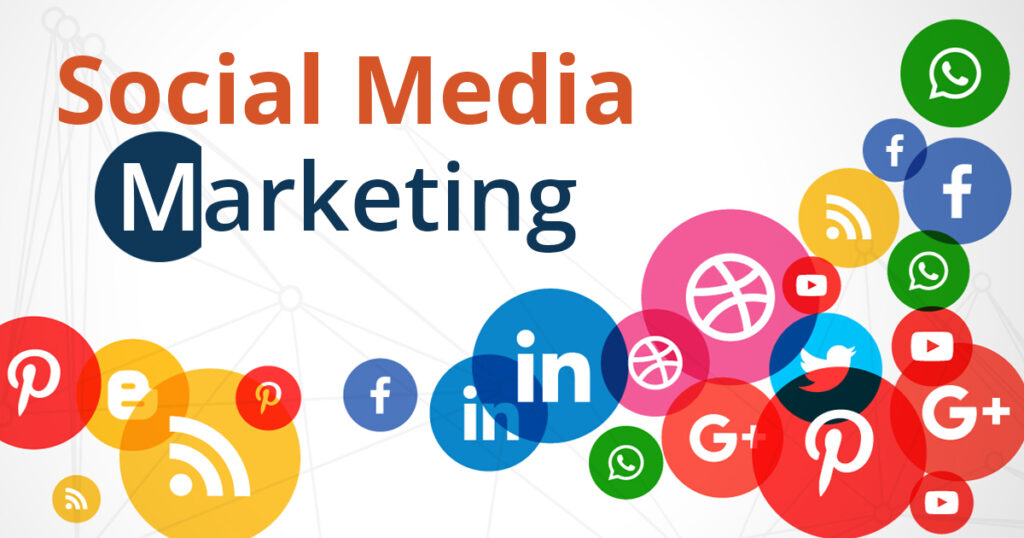
Introduction to social media Marketing :
Social media marketing refers to the use of social media platforms and websites to promote products or services, build brand awareness, and engage with customers.
It involves creating and sharing content, on social media networks such as Facebook, Instagram, Twitter, LinkedIn, and others to achieve marketing goals.
Social media marketing encompasses various strategies and tactics, including posting content. And running paid advertising campaigns, engaging with followers, and analysing performance metrics.
The primary objectives of social media marketing is to increase brand visibility, drive website traffic, generate leads. And ultimately, boost sales and revenue.
It is an essential component of digital marketing strategies, and plays a significant role in today’s business landscape.
Importance of social media marketing :
Social media marketing has become an indispensable tool for businesses in today’s digital landscape.
It offers unparalleled opportunities for brands to connect and engage with their target audience, build brand awareness, drive website traffic. And ultimately increase sales and revenue.
With billions of active users across various social platforms, businesses can leverage social media to reach a vast.And diverse audience, regardless of their size or industry.
Moreover, social media provides a platform for two-way communication. And allowing businesses to listen to their customers’ feedback, address their concerns, and cultivate meaningful relationships.
In essence, social media marketing has revolutionized the way businesses. And interact with their audience and has become a cornerstone of modern marketing strategies.
potential benefits of using social media platforms :
-
Increased Brand Visibility: Social media platforms provide businesses, with a powerful channel to showcase their brand to a large and diverse audience. By regularly posting content, And engaging with followers, businesses can increase their brand visibility, And awareness.
-
Enhanced Customer Engagement: Social media allows businesses to interact directly with their customers in real-time. Through comments, messages, and posts, businesses can engage with their audience. And answer questions, address concerns, and build meaningful relationships.
-
Targeted Advertising: Social media platforms offer sophisticated targeting, options that allow businesses to reach specific demographics, interests, and behaviours. This enables businesses to deliver highly targeted advertising campaigns, to their ideal audience, maximizing the effectiveness of their marketing efforts.
-
Increased Website Traffic: Social media is an effective way to drive traffic to your website. By sharing links to your website content on social media platforms, businesses can attract visitors and potentially convert them into leads or customers.
-
Customer Insights: Social media provides businesses with valuable insights into their audience’s preferences, behaviours, and interests. By monitoring social media activity and analysing engagement metrics, businesses can gain valuable insights that inform their marketing strategies and decision-making.
-
Cost-Effective Marketing: Compared to traditional advertising channels, social media marketing is often more cost-effective. Many social media platforms offer free organic reach. And paid advertising options are typically more affordable, than traditional advertising methods.
-
Brand Loyalty and Advocacy: Engaging with customers on social media can foster loyalty, And advocacy for your brand. By providing valuable content, excellent customer service, and personalized interactions, businesses can cultivate a loyal following of brand advocates who promote their brand to others.
Choosing right platforms :
When it comes to choosing the right platforms for your business, it’s essential to consider your target audience, business goals, and the type of content you plan to share:
-
Understand Your Target Audience: Start by identifying your target audience. And understanding their demographics, interests, and online behaviours.
Different platforms attract different demographics, so knowing your audience will help you narrow down your options.
-
Research Social Media Platforms: Familiarize yourself with the various platforms available, And their unique features, audience demographics, and content formats. Some popular platforms include Facebook, Instagram, Twitter, LinkedIn, Pinterest, TikTok, and YouTube.
-
Match Platforms to Your Goals: Consider your business goals, And objectives when choosing platforms. For example, if your goal is to increase brand awareness, And engage with a broad audience, platforms like Facebook, And Instagram may be suitable. If you’re targeting professionals, And B2B clients, LinkedIn may be more appropriate.
-
Analyse Competitor Presence: Research your competitors’ presence to see which platforms they’re active on, And where they’re finding success. While you shouldn’t necessarily copy their strategy. And analysing their presence can provide valuable insights into which platforms are relevant to your industry and audience.
-
Test and Iterate: Start by selecting a few key platforms that align with your audience and goals, and then test your presence on those platforms. Monitor your performance metrics, analyse engagement, and gather feedback to determine which platforms are most effective for your business. Be prepared to iterate and adjust your strategy based on the results.
Effective Advertising on Social Media :
Social media advertising offers businesses a powerful way to reach a larger audience. And drive conversions effectively. One of the key benefits of advertising is its ability to target specific demographics, interests, and behaviours, allowing businesses to reach their ideal audience with precision.
By leveraging advanced targeting options, businesses can ensure that their ads are seen by the most relevant users, increasing the likelihood of engagement and conversions.
Additionally, this platform advertising offers a variety of ad formats, including image ads, video ads, carousel ads, and more. And allowing businesses to choose the format, that best fits their goals and audience preferences.
When creating ad campaigns, it’s essential to focus on compelling visuals, persuasive copy. And clear calls-to-action to maximize engagement and drive conversions.
Moreover, businesses can optimize their ad campaigns by monitoring performance metrics, such as click-through rates, conversion rates. And return on investment, and adjusting their targeting, ad creative, and budget accordingly.
By continuously testing, And refining their ad campaigns, businesses can maximize their advertising efforts and achieve their marketing objectives effectively.
